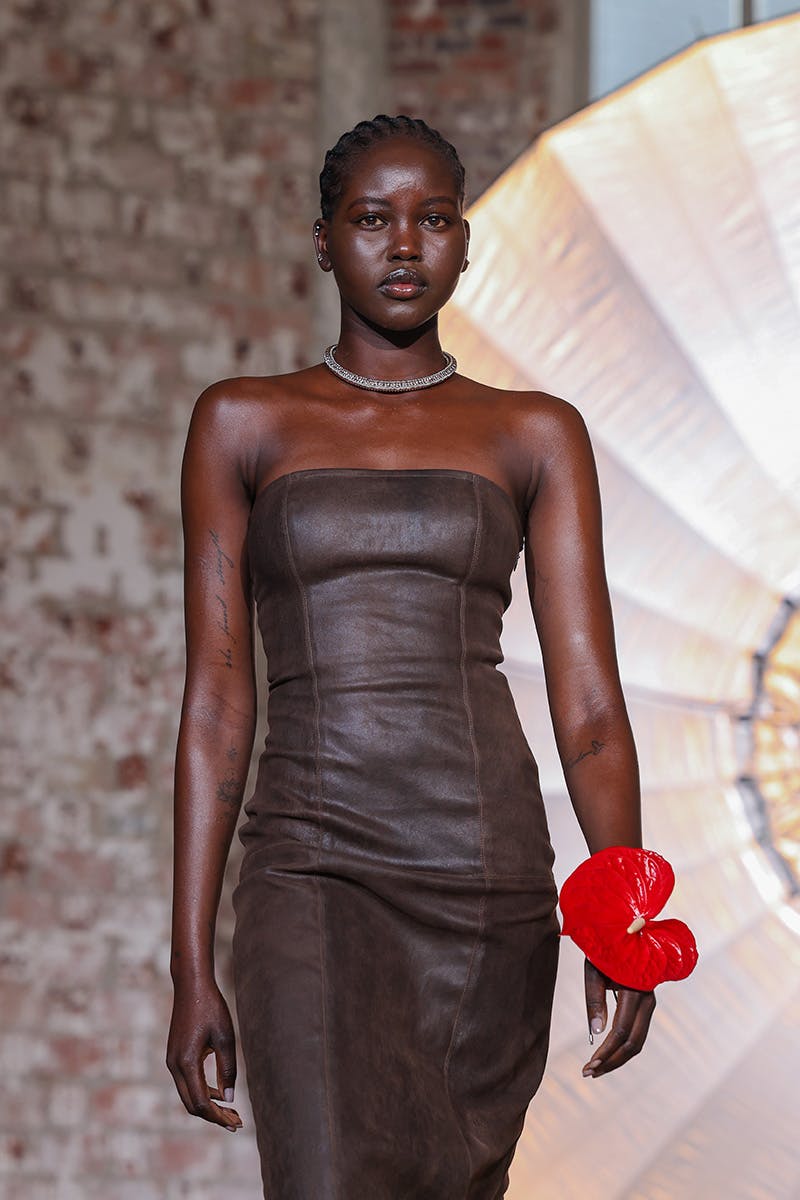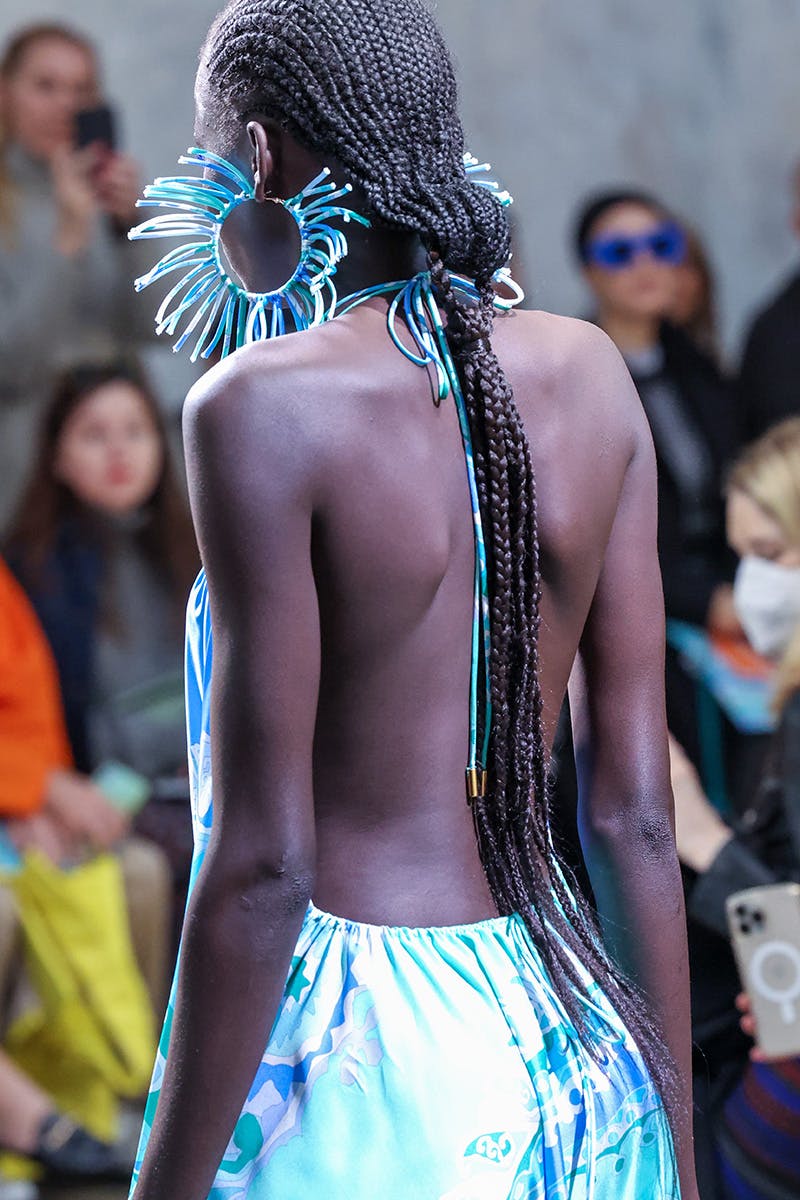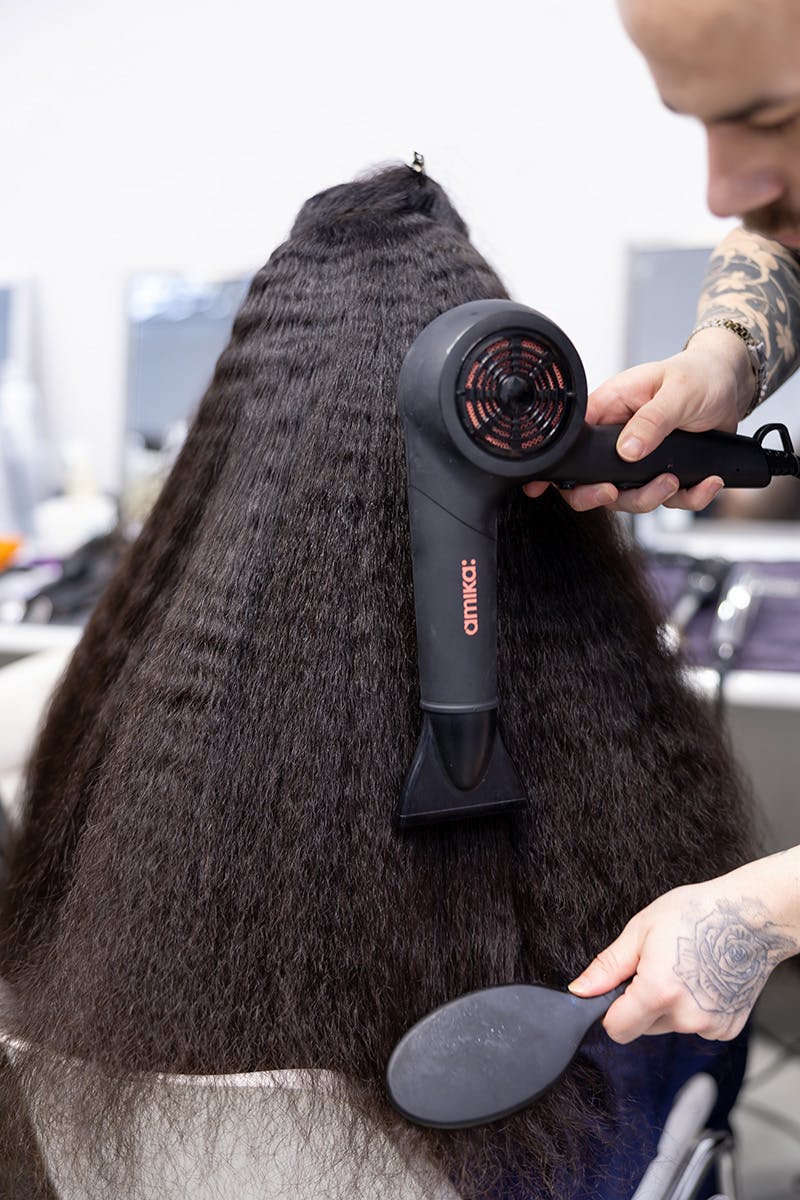It’s 2022, but the fashion industry still hasn’t solved an issue that has been present for far too long: representation across every level of fashion, including beauty. This past September Fashion Month, several Black models came forward with shocking stories of hair and makeup mistreatment backstage.
For LA-based model Taylor Larzo, the five shows she walked for this year’s New York Fashion Week were, by far, some of the most traumatic for her. On Instagram, she shared the pre and post-show health of her hair, which ended up being so poor that cutting it all off was her only option.
“I’ve gone back and forth cutting and growing it out, but this time, it was not by choice. Someone else put their hands in it, and for that to be the cause for me having to cut it was incredibly hard.”
Model Raven Schexnayder also shared a TikTok that went viral depicting non-Black hairstylists trying to pull out her hair in an attempt to attach a synthetic ponytail. The video eventually got picked up by talk show host Sherrie Shepherd.
Shepherd goes on to share a traumatic experience from earlier in her career when a hairstylist poured face powder in her hair because he thought it was too oily and then fried it with a blow dryer. As a result, she couldn’t do the show and the team had to call in a Black hairstylist to help fix it.
She ends the segment with two of the most unspoken issues for Black models and actresses: the helplessness felt from each situation, and the debilitating fact that they can’t speak out or advocate for themselves, for fear of being labeled “hard to work with.”
Alongside these pressing issues within fashion for Black models, there are also cultural ones that further complicate their relationship with hair.
“In the Black community, for hair to be considered ‘beautiful,’ it has to be long or a certain length. If it’s not, you get called names,” Larzo says.
This notion usually comes in direct conflict with what Black female models must do to have long or successful careers in fashion. Some of the top Black models in the world like Adut Akech, Aweng Chuol, Maria Borges, and Lineisy Feliz have elected to keep their hair completely shaven or short enough to be manageable on sets.
The plot thickens, especially when looking at the particular shade of Black a model falls into, as that drastically affects how short the hair can or should be. Usually, darker Black models wear a more shaven look, whereas lighter or mixed Black models, who tend to have a little more flexibility due to their hair texture, can wear it longer.

There are four main types of hair — 1–straight, 2–wavy, 3–curly, and 4–tightly curled — but all except 1 have additional levels, a, b, and c. Black people usually fall within 3 and 4 and can also have a mix of multiple types, which requires more attention and different styling techniques than 1 and 2.
Larzo explains, “My hair is 4c and requires a lot of care, oil, and conditioning, but it’s not the same texture in every area.”
Natural hair specialist and stylist Susan Ouludele says, “To style hair, you need to have the right understanding of how to care for Black hair and know how natural hair works.”
That understanding is incredibly important and something influential models like Naomi Cambell have constantly spoken out about in recent years.

In a 2016 interview with Teen Vogue, she stated, “I would be backstage at shows and there would be stylists who didn’t have any experience working with Black models. It’s disappointing to hear that models of color are still encountering these same issues all these years later.”
According to research conducted by The Fashion Spot, model “representation” on the runway is improving (although many would argue it hasn’t despite the slight rise immediately after 2020). But that trend is severely behind when it pertains to casting directors, hair and makeup teams, and stylists.
These individuals are just as important in their need for representation because they dramatically affect the way Black models are seen or able to express their full selves on the runway.
Andrea Samuels, a makeup artist and hairstylist with over a decade of experience, got into hairstyling halfway through her makeup career because she witnessed too many moments where Black talent didn’t get the attention or care that they needed. It prompted her to help where she could.
“If you are in a position where a Black model’s hair is not being treated properly, step in,” Samuels says. “Sadly, Black hair and culture are accepted for aesthetics but not always cared for or catered to on actual Black models. The real issue happens after the show is over as coily and curly hair textures need moisture, heat protection, conditioning treatments, and the proper care to bounce back to good health.”
Larzo adds, “It often feels like they want our skin in the outfits but they don’t want all of us. It also feels like there aren’t enough advocates for us from agents to the teams backstage.”
The hard truth about the industry is that many Black hair or makeup artists are either overbooked or unknown. The overbooked artists usually aren’t available because they regularly serve A-list clientele or campaigns, and the unknowns typically stay underbooked.

“There is a need for more people of color or any artist that has a great understanding of all skin tones and hair textures in film, TV, and runway. Overall, we are extremely talented and versatile, but the ones who are unknown need to get in the rooms to have consistent work,” Samuels notes.
Both Ouludele and Samuels acknowledge how challenging it is for Black hair or makeup professionals to get jobs, but also stress the need for them to get involved to help shape the industry for the better.
When it comes to coping, Larzo plainly says, “I just have to sit and live, because there is no way around it. I’ve also never been one for wigs.”
For Samuels, seeing the positive opportunity is what she cares most about. “The lack of diversity behind the scenes is disheartening, but things are slowly changing. It’s not so much about who you know, but who knows you. The people who are spreading your name in the room for opportunities [are] so key, which is why I am a huge advocate for networking.”
Bagikan Berita Ini

















0 Response to "What Fashion Does to Black Hair Is Tragic - Highsnobiety"
Post a Comment